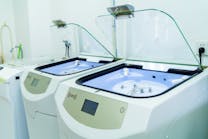In the byzantine world of policy and polity, the valiant Sterile Processing and Distribution profession may be classified as victims of forced befuddlement.
Our March cover story about manufacturer instructions for use (IFUs) inspired one devout healthcare executive to commend the coverage — story and writer — but also to ask why the adjective “validated” failed to precede the term “IFUs” for clarity and emphasis.
To HPN’s credit, the coverage did raise the idea about validated IFUs — just not so overtly. Hindsight being 20/20 and all, we could spin this perceived slight as more of a sleight because the ensuing email exchange with this executive proved to be enlightening, engaging and educational.
As a service to HPN readers we will post an edited transcript of that email exchange on HPN Online as an exclusive.
Here’s the crux of the matter in a nutshell:
- To ensure device cleaning, disinfection and sterilization effectiveness, SPD staffers should use VALIDATED IFUs provided by manufacturers.
- Device manufacturers should provide VALIDATED IFUs to their healthcare organization customers so they know how to clean, disinfect and sterilize products effectively to prevent patient infections from improperly reprocessed devices.
- The Food and Drug Administration (FDA) stipulates in its guidelines that device manufacturers validate the design, functionality and end-user operation of the devices they make, including reprocessing instructions.
Yet too many questions remain.
- For starters, who serves as the final authority on the validity and reliability of validation claims? The device manufacturer? The testing lab the manufacturer uses? The FDA?
- Who actually validates that all of these devices work as intended and can be reprocessed effectively and safely in most, if not all, cases?
- Are validation requirements standardized? How can they be for myriad devices? Should they be?
- Who validates the validation testing labs’ procedures as effective?
When there’s a breakdown in any of the procedures these questions raise, who pays? The patient/victim, provider, supplier, payer and ultimately, you and I as the taxpayer who helps fund the FDA.
The FDA does not require healthcare facility SPD departments to validate IFUs but to use “validated” IFUs. Further, the FDA may require device manufacturers to validate the required IFUs but those IFUs are not standardized, and the testing labs used to validate the IFUs are not FDA-vetted and certified.
The FDA specifies the need for validated IFUs without providing standardized parameters for neither validation procedures nor instructions on how to obtain them and from whom. The FDA also does not vet or certify (it cannot endorse, of course) any testing labs performing validation studies for IFUs. So how can device manufacturers obtain validated IFUs from testing labs not vetted and certified by the very agency calling for all of this testing and validation? Meanwhile, healthcare SPD teams merely follow what they receive from manufacturers, not realizing that they will be legally and financially liable for the consequences.
Supply Chain and SPD pros (and GPOs) must demand that any and all devices and products include authentically validated IFUs as a requirement for contract consideration or they won’t be acquired. Device manufacturers must obtain validated IFUs for all products they make (past, present and future) as a condition for obtaining FDA pre-market approval (PMA) or 510(k) clearance to sell those products. Device manufacturers must use FDA-vetted and certified testing labs that rely on standardized testing parameters — either through AAMI or ANSI — to issue validated IFUs. The FDA must establish guidelines that specify the use of certified testing labs that employ standardized validation testing parameters as a condition for device clearance, sale and use. Payers should not reimburse for clinical procedures where devices without validated IFUs from certified testing labs have been used.
Regrettably, we all will pay more for this intensified scrutiny. But we can’t afford perplexity from complexity any longer.

Rick Dana Barlow | Senior Editor
Rick Dana Barlow is Senior Editor for Healthcare Purchasing News, an Endeavor Business Media publication. He can be reached at [email protected].





